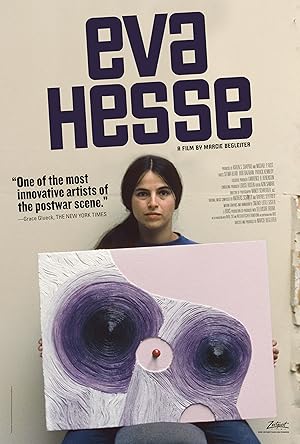
Eva Hesse
- PG-13
- Year:
- 2016
- 108 min
- $114,105
- 132 Views
1
EVA HESSE". There's not been
one normal thing in my life.
Not one.
Art is the easiest thing.
It doesn't mean
but H's the only thing I never had to.
Eva Hesse was one of the
greatest artists of the 20th century.
Her idea was to make an art
that was on the borderline
of uncontrollability.
This was someone Who'd not
simply made small scale work,
making really major statements.
HESSE". I have the most
openness about my art.
I'm willing, really,
to walk on the edge.
And if! haven't achieved it,
that's where f want to go.
Her sensibility was exquisite.
And you could feel the tension in her voice
when she spoke about her work.
HESSE:
I get so close,then change,
destroy.
I get distrustful of myself...
Painting went lousy today...
To be able to finish one
and stand ground.
This is me.
This is what I want to say.
Eva's life and her art definitely merged.
She wasn't just manipulating materials,
she was the materials.
It all fell together at one point for her.
And she ran with it.
HESSE:
One day,it will all fit together,
and I feel capable
It will all have been Worthwhile
for What I've gained from it.
(JAZZ MUSIC PLAYING)
HESSE". I'm not a writer.
Nor, may you say
should be that pretentious
to write down my thoughts.
An Autobiographical Sketch of a Nobody.
This is the story of one whom,
from the outside,
reveals a rather pretty picture.
Pretty face,
pretty body
pretty dress.
However, the person
does not feel pretty inside.
I have felt, for the
majority of my life,
different, alone,
and apart from others.
To complicate the matter some,
for the last years I have shown and
developed talents as a painter,
a good one, at that.
Was H in my feeling
estranged and different
that I could claim
the title of painter'?
What I've accepted as the answer is
that the true artist
is paradoxically also
the true personal misfit.
Eva was definitely my father's favorite.
Not because...
Only because he, I think,
felt that she was more vulnerable.
I was the older one
and I understood more.
But I think that he was so off base.
Eva was the strong one.
There were times she felt helpless.
But she had gutsiness
right from the get-go.
HESSE:
When I was 16,I Went to Pratt Institute.
And I didn't like it very much at all.
When you started painting class,
you had to do a lemon still life.
And then, you graduated to
And then, you graduated to a lemon,
bread, and egg still life.
This was not my idea of painting.
I waited until I was getting As
instead of Cs,
and declared I was quitting.
I had to know that it Wasn't
because I Wasn't doing Well.
So, I had to go home.
As soon as I got there,
my stepmother said, Get a job.
So where do you go at 16-and-a-half,
knowing very little
and having an interest in art'?
I took myself to Seventeen Magazine.
And for some strange reason,
they hired me.
I think H was just because
of the gall of coming up there.
She had the experience of
working at a woman's magazine
and she said it made
a huge difference for her,
that it gave her confidence.
And she got some of her work
out into the world.
HESSE". I took the middle of the year
test for Cooper Union,
and that was the only plan I made.
I had to make H.
{got m.
And the following September,
I Went to Cooper Union,
which I loved from the very start.
Eva was certainly aware
that she wanted to be an artist.
But my father could not accept that.
WILLIAM HESSE:
Dear Evachen,you were always very successful
in all that you did.
But painting and studying
are pleasant jobs.
In order to stand on your feet,
you have to do things which you feel
today are not so pleasant.
And if a person has a job
or earns a living,
this is something which
also gives satisfaction.
HESSE". Daddy, I want to do
more than just exist,
to live happily and contented
with a home, children,
to do the same chores every day.
Lam an artist.
I Want to experience
all What life has to offer.
And I have to do this for myself.
ROSIE GOLDMAN:
{met Eva when she was 17.
What fascinated me most about her
was her hands.
She spoke with her hands.
All the vitality in her
came through her hands.
We spent an enormous
amount of time together.
And that became
a very close friendship.
HESSE". Dearest Rosie,
I dreamt that you and I
collaborated on a book
Where We talked over our entire past,
very honest, nothing hidden.
The whole bit.
GOLDMAN". She was living on Jane Street.
She had a little room
with a gigantic bed.
She was very comfortable in this
box, almost, of a room.
As long as she could
do her art, it didn't matter.
SYLVIA:
We bothWent to Cooper Union and Yale.
I was two years younger than her
so I watched her.
I had this sense that
she was somebody to watch.
She was a very smart,
articulate and beautiful person
who needed someone to listen to her
so she could gel ll all out and work.
She went to Yale and studied painting,
famously with, most famously
with Josef Albers.
HESSE:
I was Albers'little color study/st.
Everybody always called me that.
And every time he walked
into the classroom,
he would ask, What did Eva do?
The last two years have probably been
the two most eventful,
with the greatest of change
deep inside myself.
We become a painter.
SUSSMAN:
She finished art schoolat the end of the 'SOs
and she went from Yale
into New York in 1960.
Kennedy had been elected.
This was really the dawn of a new age.
(UPBEAT MUSIC PLAYING)
HESSE:
I've moved so rapidly.I feel so alive.
I'm almost too anxious for every moment
and every future moment.
Being an artist in New York City
in the '60s was totally wonderful.
It was a great time.
and music, literature, poetry,
but particularly in painting,
everything was opening up.
There was a feeling like
we were reinventing painting.
HESSE". I will abandon restrictions
and curbs imposed on myself.
I will strip me of
superficial dishonesiies.
I will paint against every rule.
And you have to understand
that that time,
there wasn't any art world.
There were people making work
for themselves and for each other.
And there wasn't any product.
Commodification hadn't happened.
The art world hadn't been
taken over by collectors.
No one was thinking about how much
money they were going to make.
It was all dedicating
your life to your work.
And I know that Eva felt that way, too.
HESSE". Only painting can
now see me through.
It is totally interdependent
with my entire being.
H is what I have found through
which I can express myself.
SOL LEWITT:
She came to New York and I met her.
She'd just gotten out of Yale.
Eva was very pretty and cute,
very alive and hip, and knew a lot
of people because of being at Yale.
I recognized that she had
something extraordinary about her work.
Translation
Translate and read this script in other languages:
Select another language:
- - Select -
- 简体中文 (Chinese - Simplified)
- 繁體中文 (Chinese - Traditional)
- Español (Spanish)
- Esperanto (Esperanto)
- 日本語 (Japanese)
- Português (Portuguese)
- Deutsch (German)
- العربية (Arabic)
- Français (French)
- Русский (Russian)
- ಕನ್ನಡ (Kannada)
- 한국어 (Korean)
- עברית (Hebrew)
- Gaeilge (Irish)
- Українська (Ukrainian)
- اردو (Urdu)
- Magyar (Hungarian)
- मानक हिन्दी (Hindi)
- Indonesia (Indonesian)
- Italiano (Italian)
- தமிழ் (Tamil)
- Türkçe (Turkish)
- తెలుగు (Telugu)
- ภาษาไทย (Thai)
- Tiếng Việt (Vietnamese)
- Čeština (Czech)
- Polski (Polish)
- Bahasa Indonesia (Indonesian)
- Românește (Romanian)
- Nederlands (Dutch)
- Ελληνικά (Greek)
- Latinum (Latin)
- Svenska (Swedish)
- Dansk (Danish)
- Suomi (Finnish)
- فارسی (Persian)
- ייִדיש (Yiddish)
- հայերեն (Armenian)
- Norsk (Norwegian)
- English (English)
Citation
Use the citation below to add this screenplay to your bibliography:
Style:MLAChicagoAPA
"Eva Hesse" Scripts.com. STANDS4 LLC, 2025. Web. 21 Jan. 2025. <https://www.scripts.com/script/eva_hesse_7781>.



Discuss this script with the community:
Report Comment
We're doing our best to make sure our content is useful, accurate and safe.
If by any chance you spot an inappropriate comment while navigating through our website please use this form to let us know, and we'll take care of it shortly.
Attachment
You need to be logged in to favorite.
Log In